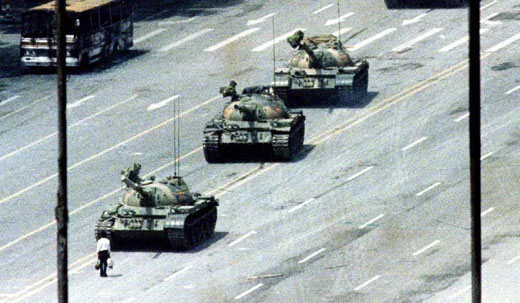by WorldTribune Staff, June 4, 2020
On the 31st anniversary of the Tiananmen Square massacre, the Chinese Communist Party imposed a new rule in Hong Kong — disrespect of the China national anthem is prohibited.
As another in a long line of moves by the Xi Jinping regime to eliminate Hong Kong’s autonomy was imposed, a survivor of the June 4, 1989 massacre and the president of a religious freedom organization vowed that Hong Kong “is not dead.”

Xi “thinks China’s illegal crackdown will force Hong Kongers into submission, rescuing his legacy. It won’t,” Yang Jianli, a Tiananmen survivor and founder of Citizen Power Initiatives for China and Aaron Rhodes, president of the Forum for Religious Freedom-Europe, wrote for National Review.
“Hong Kong is not dead, and we need only look back toward Tiananmen to see why. After 1989, heroes such as Liu Xiaobo and many others emerged despite an arbitrarily enforced ‘National Security Law,’ revealing by their courage and sacrifices the immorality and fraudulence of the Chinese Communist regime. The people of Hong Kong are better equipped, spiritually, politically, and materially, as well as internationally, than the 1989 generation of human-rights dissidents,” Yang and Rhodes wrote.
Last month, China unveiled its new security law which bans what the communist regime terms “treason, secession, sedition [and] subversion” in Hong Kong.
“Unlike the mainlanders, the people of Hong Kong have lived in freedom, under the rule of law, and in a polity close to a democracy. They have a better understanding of, and treasure more, a life of freedom and dignity. Backing down before Chinese Communist Party pressure would mean the end of their way of life, the end of their unique and cherished identity and community, and indeed, a kind of spiritual death. They are ready to sacrifice their lives to avoid this,” Yang and Rhodes wrote.
The CCP “has never represented the people of Hong Kong any more than it has represented the people of Taiwan, and it never will.”
The communist government and been persistent it its “efforts to destroy, censor, conceal, and suppress information about the Tiananmen massacre, in particular the courage and defiance encapsulated in the image of the ‘Tank Man.’ But over time, the image has become emblematic of the nature of the Chinese Communist Party (CCP), and a deep stain on its moral legitimacy that, like the imagined blood on Lady Macbeth’s hands, won’t wash off,” Yang and Rhodes wrote.
“Do the people of Hong Kong, and of mainland China, want to live as faceless and powerless servants of CCP elites, their moral choices limited, forced into complicity in crimes against political and religious minorities? Do Chinese leaders want to ride the current regime down, and face an explosion of discontent?
“Ultimately, the battle for Hong Kong is a battle of ideas, one in which liberal societies, which have in recent decades lost some of their own commitment to freedom, have a huge stake. The ‘Tank Men’ of Hong Kong can defy Beijing’s ‘Rolling Tanks,’ ” Yang and Rhodes wrote.
The U.S. State Department said in a statement:
Today we honor the brave Chinese people whose peaceful calls for democracy, human rights, and a corruption-free society came to a violent end when the Chinese Communist Party (CCP) sent the People’s Liberation Army into Tiananmen Square on June 4, 1989, armed with tanks and guns. While the Tiananmen protests inspired the oppressed in the Soviet Union and Eastern Europe to demand and achieve democratic change, the Chinese communist government survived with oppressive control of information and sheer brutality.
Thirty-one years later, the total number of missing or dead Tiananmen protesters is still unknown. The United States continues to applaud their aspirations, and the American people stand with the families still grieving their lost loved ones, including the courageous Tiananmen Mothers who have never stopped seeking accountability for their children’s deaths, despite great personal hardship and risk. We reiterate our call for a full, public accounting of those killed or missing.
We mourn the victims of June 4, 1989, and we stand with the people of China who continue to aspire to a government that protects human rights, fundamental freedoms, and basic human dignity.
Intelligence Brief __________ Replace The Media
